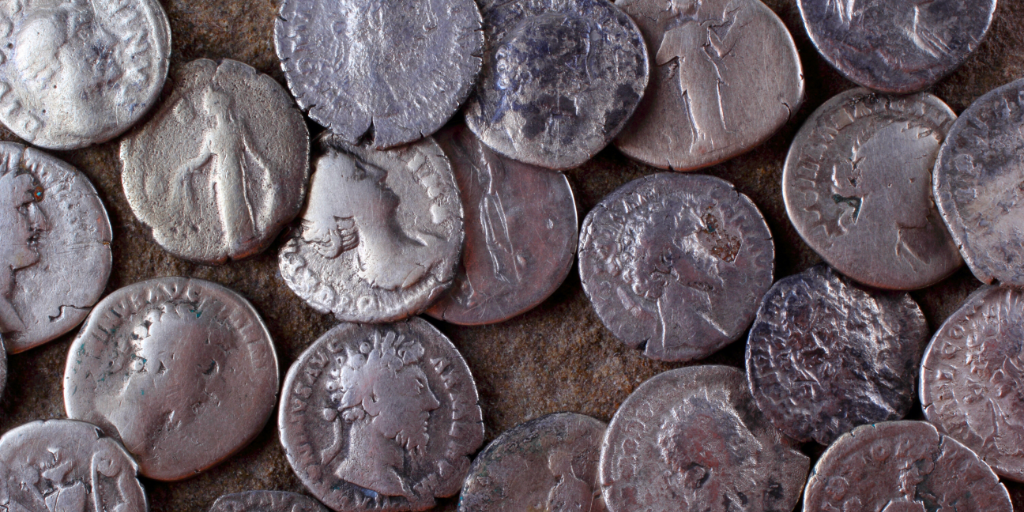
Liesl Schiavone reflects on Spy Wednesday and how she, at times, can be like Judas.
Seeing Ourselves on Spy Wednesday
During the 2020 Covid Quarantine, Catholics everywhere found themselves navigating the events of Holy Week on their own, away from their parishes and their pastors. It was a strange time, a time when we needed the sacraments more than ever but were unable to access them. As we said at the time, “this is the lentiest Lent ever.” For many of us, we learned what it feels like when those sacred traditions are taken away from us in our need.
It was during this time that so many great Catholic influencers took to social media to help lay people live out Holy Week in their homes. I remember us writing “Hosanna to the Son of David” in chalk our front sidewalk and waving paper palms. I remember washing feet at home and praying Stations of the Cross at our kitchen table. I remember doing everything I could to help my kids understand that even though our world looked different, Christ’s Passion is still important, and the Resurrection still happened.
In hindsight, it was a fruitful time for my domestic church, and I’m grateful for all the inspiration for Catholic living that I learned from my online Catholic sisters.
I don’t think I had thought much about “Spy Wednesday” until that year when it came through on the list of “things to do during Holy Week.” Of course, I knew Judas as the betrayer, that he turned Jesus over for 30 pieces of silver, but I don’t think I had really contemplated the details of the story and how it applies to our own fallen lives.
Judas’ Sin
The story of Judas is as infuriating as it is devastating. We know that it was not the chief priests who came to Judas, but Judas who went to them. His actions were pre-meditated, planned out. He knew what he was doing, and he chose to turn Jesus in.
Then one of the Twelve, who was called Judas Iscariot, went to the chief priests, and said, “What are you willing to give me if I hand him over to you?” They paid him thirty pieces of silver, and from then on, he looked for an opportunity to hand him over. (Matthew 26: 14-16)
Reading this passage makes me angry, even more angry than when Judas arrives in the Garden of Gethsemane. This passage shows a measured decision, not a moment of weakness. I feel overwhelmed with disappointment: How could he be so stupid? How could he throw away his love for Jesus?
We are so quick to wave a finger at Judas, to look at him with so much disgust and hatred. What he did was so disgraceful, so shameful, so devasting. The Crucifixion of our Lord was a direct result of Judas’ betrayal — we have a right to be angry.
But do we so easily forget that we too act as Judas did? That Jesus bore our sins on the cross as well as Judas’. Not only do we bow to other gods: money, power, and fame — but we do it knowing full well what we are doing. We plan it out, we look for opportunities to turn away from love itself, opportunities to push aside what we know to be true. So often, as Judas did — we betray Jesus with words on Wednesday and again with a kiss when we meet him in the Garden on Thursday.
While he was still speaking, Judas, one of the Twelve, arrived, accompanied by a large crowd, with swords and clubs, who had come from the chief priests and the elders of the people. His betrayer had arranged a sign with them, saying, “The man I shall kiss is the one; arrest him.” Immediately he went over to Jesus and said, “Hail, Rabbi!” and he kissed him. (Matthew 26:47-49)

Our Response to Our Fallen Nature
We know that Judas greatly regretted what he did. He tried to make amends, but the chief priests wouldn’t take back what they had done, even when Judas desired it — and so he fell into despair. Scripture tells us:
Then Judas, his betrayer, seeing that Jesus had been condemned, deeply regretted what he had done. He returned the thirty pieces of silver to the chief priests and elders, saying, “I have sinned in betraying innocent blood.” They said, “What is that to us? Look to it yourself.” Flinging the money into the temple, he departed and went off and hanged himself. Matthew 27:3-5
Our sins crucified Jesus too, but our story doesn’t need to end as Judas’ did.
We need not despair.
We know the end of the story.
Had only Judas sought forgiveness, had only he repented for what he had done. He could have known Jesus in paradise.
Peter’s Repentance
Judas’ sin wasn’t the only sin of the apostles during Holy Week. Peter denied Jesus too. He was sure he wouldn’t, that his love for Jesus would be too strong for sin. He was so sure he could never deny his Lord. He says,
“Even though I should have to die with you, I will not deny you.” (Matthew 26:35)
Yet, he in the heat of the moment, when others came at him, and fear overcame him. Peter did deny our Lord. He denied him three times before the cock crowed.
At that be began to curse and swear, “I do not know the man.” And immediately the cock crowed. Then Peter remembered the word that Jesus had spoken. ‘Before the cock crows you will deny me three times.” (Matthew 26: 74-75)
The significant difference between Judas’s betrayal and Peter’s denial is the reaction to their fallenness. That where Judas despaired and took his own life, Peter wept, and ultimately stayed faithful to Jesus and his mission, becoming not only a great saint, but our first Pope.
The Lord knows our weakness, He knows that we will fail, He knows that we are sinners — and He loves us anyway. He loves us so much that He was led as a lamb to slaughter and willingly bore our transgressions.

This Holy Week, may we pray for the wisdom to not despair like Judas, but to trust in His Divine Mercy, like Peter did.
Share your thoughts with the Catholic Mom community! You'll find the comment box below the author's bio and list of recommended articles.
Copyright 2025 Liesl Schiavone
Images: Canva
About the Author

Liesl Schiavone
Liesl and her husband are raising their 6 kids in their house close to the Chesapeake Bay. She and her husband, Matt, serve their local parish as Director of Music and High School Youth Minister respectively. Liesl has worked as a music educator for the last 15 years and finds great satisfaction in writing about the joys and challenges of motherhood. Follow her on social media @sacramom.


.png?width=1806&height=731&name=CatholicMom_hcfm_logo1_pos_871c_2728c%20(002).png)
Comments